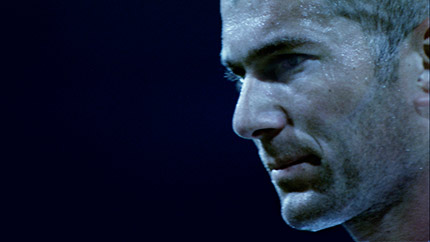


The media is still speculating about what the words were that Marco Materazzi uttered that made Zinédine “Zizou” Zidane blow a fuse in the World Cup final in 2006. There can probably be no single sentence that could exhaustively explain Zidane’s “rosebud”, the emotional trigger that made him lose control and earn the red card which gave an embarrassing end to the fabulous career of the legendary football player.
Zidane: A 21st Century Portrait (2006), directed by Douglas Gordon and Philippe Parreno, can be compared to Orson Welles’ masterpiece Citizen Kane (1941) as it revolves around an insoluble riddle: what is it like to be Zidane, the best football player in the world? The film is an intimate psychological portrait that takes the spectator as close as possible to its protagonist in a very concrete way, close enough to feel him breathe. The fundamental idea is ingenious in its simplicity: Seventeen film cameras follow Zidane in a close-up at his place of work, the Stadio Bernabéu of Madrid in a La Liga match between Real Madrid and Villareal on 23 April 2005. The end result is a real-time football film that jettisons standard solutions and focuses on one single person. Even to a spectator completely bored by professional sports, Zidane is a liberating experience: nothing is explained, no biographical background detail provided. What remains is the moment, the movement, the fervour and the fever pitch of the stadium.
Almost all films dealing with football have been forgotten fairly quickly. The subject matter is a difficult one, because the drama of the real match is always more powerful and more real than the psychologised version that has been put through the machinery of film production. Zidane succeeds in catching the heady atmosphere of the spectacle and the tension of the unscripted game in a fabulously intensive manner. The film has been called “the greatest film about football ever made” — and for good reason.
The directors, Gordon and Parreno, are visual artists. They pondered the idea of a perfect football film for a couple of years before ending up with the extremely pure form they use in Zidane. After winning over Zidane and getting Real Madrid to approve the project, they recruited top sports cinematographers, who have been trained shooting NFL games, for their crew, and took all of them on a private tour of the Prado Museum of Art in order to familiarise them with portraits painted by Goya and Velásquez. Gordon and Parreno wanted to make a portrait of the celebrated modern hero using contemporary tools. The director of photography in Zidane is Darius Khondji, known from films such as Se7en and Delicatessen. The end result is a stunning cavalcade of images: Zidane is visual sports entertainment unlike anything seen before. The film score was provided by the Scottish band Mogwai.
The project entailed great risks, because the directors wanted to shoot the footage during one single match in less than two hours. What would happen if Zidane was injured five minutes into the game? We will not reveal the ending, but the attentive spectator can notice signs in the film of what would happen in the notorious 2006 World Cup final.
The Scottish artist Douglas Gordon (1965–) is one of the internationally most recognised contemporary artists. His cross-disciplinary works often deal with icons of popular culture and “the collective subconscious”. Gordon won the Turner Prize in 1996, and the following year was the representative of Great Britain at the Venice Biennale. His retrospective exhibitions have been on display in venues such as the Guggenheim museum of Berlin and MoMa in New York. The Parisian artist Philippe Parreno (1964–) is also a well-known visual artist, whose solo exhibitions have been displayed in many important art museums throughout Europe and the United States. In Zidane, both of them were working as the directors of a 35 mm feature film for the first time.
Mika Taanila
Zidane: A 21st Century Portrait (France 2006, 90 min, 35 mm)
Kiasma Theatre on Friday, 16 November at 5 pm,
second screening on Saturday, 17 November at 5 pm.
N.B. Free admission with a Zidane jersey.

Zidane